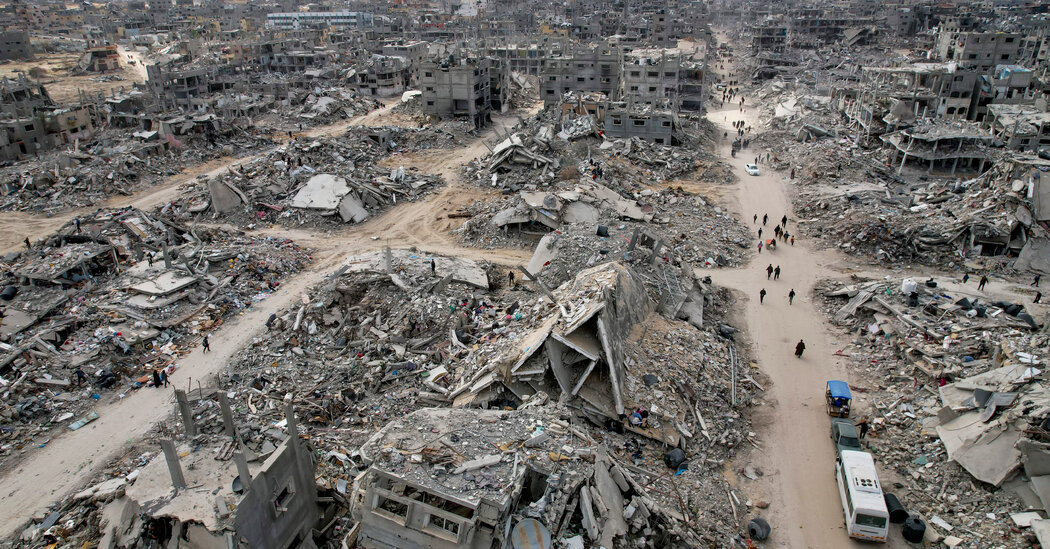Minutes after the fighting stopped in Gaza on Sunday, Islam Dahliz and his father and brother set out for the neighborhood where they had lived until Israeli forces ordered them to leave. They were looking for the family home, but the landscape around them scrambled the senses. Familiar landmarks, streets, neighbors’ houses — everything was rubble.
Then Mr. Dahliz recognized the local wedding hall, he said, or what remained of it. That meant their home stood — had stood — behind them, in a spot they had already passed. They just hadn’t recognized it, this house that Mr. Dahliz’s father had built more than 50 years ago.
“It took us a few minutes to accept that this pile of rubble was our home,” said Mr. Dahliz, 34, who works with local aid groups. They stood there, speechless.
His 74-year-old father, Abed Dahliz, felt the wind knocked out of him, he said. His sons had to help him back to their tent to rest.
“I was shocked when I saw my entire life — everything I worked for — flattened to the ground,” said Abed Dahliz, a farmer all his life, his voice soft and trembling. “The home I spent so many years building, pouring my savings into, is gone.”
This was not the moment they had hoped for and pictured all these months, as they were forced to move from tent to tent to tent, packing up and starting over four times in all. They had imagined a return. A resumption of their lives.
In their latest makeshift tent in a park in western Rafah, the southernmost city in Gaza, they had huddled on Sunday morning, when the cease-fire was supposed to take effect, glued to the radio. Islam Dahliz was on his phone, refreshing social media accounts for the latest news. The whole family tensed when they heard that the truce might collapse over a last-minute hitch: Hamas, Israel said, had not handed over the promised list of Israeli hostages to be freed from Gaza.
Then, at 11:15 a.m., the radio reported that the cease-fire was on. The father and the brothers got in the car, they said, and set out for home.
Home had been a spacious two-story house on al-Imam Ali Street in Rafah, built in 1971 and shared, like many homes in Gaza, by three generations of the same family. The parents lived in one apartment, and Mr. Dahliz, his wife and their children had another. He had put his savings toward a new kitchen, furniture and bedding when he came back to Gaza from Hungary, where he had been studying agricultural science, he recalled.
His brothers Mohammed and Anas had also lived there with their families, with another brother a half-mile away. It was big enough that during the first seven months of the war, the Dahlizes could host around 10 other families that had evacuated from elsewhere in Gaza.
Next door was their farm, started by their father and tended by Mohammed, 40. Olive trees and date palms stood side by side with greenhouses where they grew parsley, lettuce and arugula. They had had rabbits, chickens and 40 sheep, which Mohammed used to lead to the fields to graze every morning.
Mohammed Dahliz could remember his father planting the palm trees when he was a little boy, he said. He could remember his own young children before the war, he said, chasing the chickens around and laughing, gathering their eggs for breakfast.
The Israeli military has said that it struck residential areas because Hamas fighters were embedding themselves in civilian buildings, though a New York Times investigation found that Israel also weakened civilian protections to make it easier to bomb Gaza during the war.
When Israeli forces invaded Rafah in May and ordered everyone in eastern Rafah to leave, Islam Dahliz said, the vegetables were just starting to sprout. The families who had been sheltering at the Dahlizes’ dispersed. The Dahlizes packed up some clothes, tarps and other materials for a makeshift tent, and picked a spot for it as close as they could find to home.
But they didn’t lay eyes on it for months, despite being just a few miles away.
Their cousins managed to sneak into the neighborhood from time to time, bringing back updates. Their home was still standing, they reported. Then they said it was standing, but some of its doors and windows had been blown out.
In the fall, the Dahlizes scoured satellite images circulating on social media: still intact. Then they checked again on Dec. 8, Islam Dahliz recalled. All they saw where the house had been was a gray shadow.
Now their palm and olive trees were knocked down, trunks scattered on the ground. Israeli tanks had left tracks all over their land. Little stood straight on their property other than a few concrete pillars with rebar sticking out of them.
“I feel lost, utterly lost,” said Mohammed Dahliz. Then, becoming angry, he said: “This was an agricultural area, a place of peace. It posed no threat to anyone, no danger to soldiers. We had no ties to politics, no reason to be caught in this violence.”
Islam Dahliz’s daughter Juan, 9, screamed when he showed her pictures of the destruction, he said. “Remember, Daddy, when you threw me a birthday party in the big hall?” she asked, sobbing.
On Monday morning, the brothers and their father drove to their neighborhood a second time, down a road jammed with other families, every vehicle overflowing with passengers and bundled belongings. They were all there to salvage whatever they could. All over Rafah, people filled tattered flour sacks and patched-up bags with scraps of metal they could perhaps sell or reuse and wood they could perhaps burn.
Mohammed Dahliz was just hoping to find some of his 14-year-old daughter Jana’s old toys, the kind he had brought her on her birthday or every time she reached a milestone in school. She had begged him to look for them, he said.
“I just want to find a piece of her childhood,” he said. “I’ve been searching since morning, hoping to find anything that belonged to her.”
Digging through the grayness, Islam Dahliz stumbled on his old school certificates, a discovery that produced a smile. But otherwise, they hadn’t found much. Firewood, a few pillows, an empty tank they hoped to repair.
He was clinging to plans, however fragile.
If — if — the two sides negotiated a permanent end to the war, as they are supposed to attempt during the cease-fire’s initial phase, the Dahlizes would hire a bulldozer to clear the rubble, first from the farm, then from the house. They would install some pipes, build a basic toilet and set up a water tank, he said.
“It won’t end the suffering,” he said, “but at least it’ll be closer to the home where we created so many memories.”
But for now, dusk was falling. They would have to return to their tent. What remained of the Dahlizes’ old lives barely filled the back of one small car.


